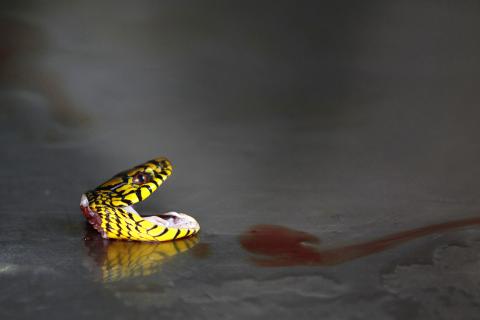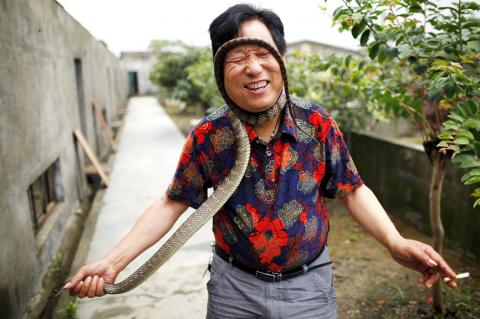This sleepy village nestled in the heart of vast farmland in China’s eastern Zhejiang Province hides a deadly secret.
A step into the homes of any of the farming families here brings visitors eye-to-eye with thousands of some of the world’s most feared creatures — snakes, many of them poisonous.
Cobras, vipers and pythons are everywhere in Zisiqiao, aptly known as the snake village, where the reptiles are deliberately raised for use as food and in traditional medicine, bringing in millions of US dollars to a village that otherwise would rely solely on farming.

Photo: Reuters
“As the No. 1 snake village in China, it’s impossible for us to raise only one kind of snake,” said Yang Hongchang, the 60-year-old farmer who introduced snake breeding to the village decades ago. “We are researching many kinds of snakes and the methods of breeding them.”
In 1985, Yang started selling snakes he caught around the area to animal vendors. He soon began to worry that the wild snakes would run out and thus began researching on how to breed snakes at home.
Within three years, he had made a fortune — and many other villagers decided to emulate his success.

Photo: Reuters
Today, more than 3 million snakes are bred in the village every year by the 160 farming families.
Snakes are renowned for their medicinal properties in traditional Chinese medicine and are commonly drunk as soup or wine to boost the person’s immunity.
Yang has now started his own company to make his business more formal and build a brand, and also to conduct research and development for his products, which range from dried snake to snake wine and snake powder.
“Our original breeding method has been approved and recognized by the province and the county. They see us as the corporation working with the farming families,” Yang said. “So the company researches on the snakes and they hand them over to the farms for breeding. They said this model was working very well.”
The original breeding method was simply putting males and females together, but now meticulous research is done on how the snakes breed, how to select good females, investigation into their diet and how to incubate eggs so survival rates rise.
With rising demand for snake products from restaurants and medicine halls due both to rising wealth and a government push for breeding the animals to be used in traditional medicine, Zisiqiao villagers are now boasting a annual income of hundreds of thousands of yuan a year.
Yang Xiubang, 46, has been raising snakes in his home for more than 20 years and said his annual income has been steadily rising.
“The demand for traditional Chinese medicine is quite high in China,” he said. “After we finish producing the dried snake, most of them are sent to medicine factories. This also includes snake livers and snake gallbladders.”
Yang added snake products from the village are currently being exported globally to countries such as the US, Germany and Japan.
Closer to home, snake products from the village are sold Hangzhou, where the Hangzhou Woai Co offers a plethora of goods, including snake powders.
“Each part of the snake is treasured,” store manager Gao Chenchang said.

A beauty queen who pulled out of the Miss South Africa competition when her nationality was questioned has said she wants to relocate to Nigeria, after coming second in the Miss Universe pageant while representing the West African country. Chidimma Adetshina, whose father is Nigerian, was crowned Miss Universe Africa and Oceania and was runner-up to Denmark’s Victoria Kjar Theilvig in Mexico on Saturday night. The 23-year-old law student withdrew from the Miss South Africa competition in August, saying that she needed to protect herself and her family after the government alleged that her mother had stolen the identity of a South

BELT-TIGHTENING: Chinese investments in Cambodia are projected to drop to US$35 million in 2026 from more than US$420 million in 2021 At a ceremony in August, Cambodian Prime Minister Hun Manet knelt to receive blessings from saffron-robed monks as fireworks and balloons heralded the breaking of ground for a canal he hoped would transform his country’s economic fortunes. Addressing hundreds of people waving the Cambodian flag, Hun Manet said China would contribute 49 percent to the funding of the Funan Techo Canal that would link the Mekong River to the Gulf of Thailand and reduce Cambodia’s shipping reliance on Vietnam. Cambodia’s government estimates the strategic, if contentious, infrastructure project would cost US$1.7 billion, nearly 4 percent of the nation’s annual GDP. However, months later,

Texas’ education board on Friday voted to allow Bible-infused teachings in elementary schools, joining other Republican-led US states that pushed this year to give religion a larger presence in public classrooms. The curriculum adopted by the Texas State Board of Education, which is controlled by elected Republicans, is optional for schools to adopt, but they would receive additional funding if they do so. The materials could appear in classrooms as early as next school year. Republican Texas Governor Greg Abbott has voiced support for the lesson plans, which were provided by the state’s education agency that oversees the more than

The Philippine Department of Justice yesterday labeled Vice President Sara Duterte the “mastermind” of a plot to assassinate the nation’s president, giving her five days to respond to a subpoena. Duterte is being asked to explain herself in the wake of a blistering weekend press conference where she said she had instructed that Philippine President Ferdinand Marcos Jr be killed should an alleged plot to kill her succeed. “The government is taking action to protect our duly elected president,” Philippine Undersecretary of Justice Jesse Andres said at yesterday’s press briefing. “The premeditated plot to assassinate the president as declared by the self-confessed mastermind